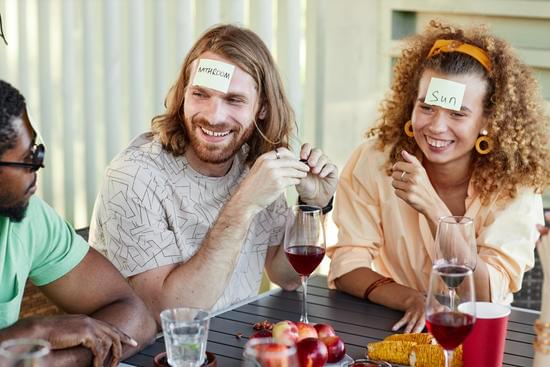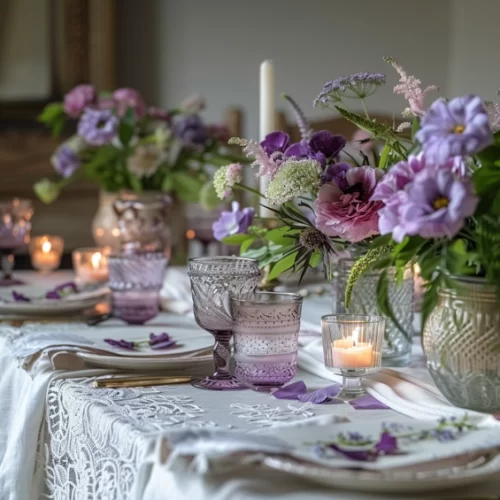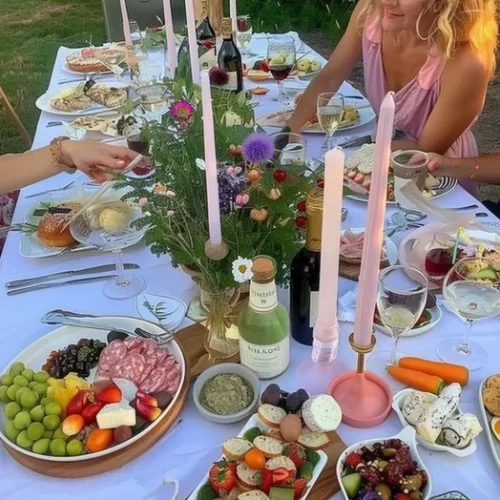
When attending a dinner party, being a good guest is just as important as being a good host. A good guest can make the party enjoyable for everyone, while a bad guest can ruin the evening. So, what does it take to be a good guest at a dinner party?
Firstly, it’s important to arrive on time. Being punctual shows that you respect the host’s time and effort in preparing for the party.
If you’re running late, make sure to call or text the host to let them know. Additionally, it’s important to dress appropriately for the occasion. If the invitation specifies a dress code, make sure to follow it. If not, dress in a way that is respectful and appropriate for the event.
Secondly, it’s important to bring a gift for the host. This can be a small token of appreciation, such as a bottle of wine or a bouquet of flowers. It shows that you appreciate the effort the host has put into the party and that you’re grateful for the invitation.
Finally, it’s important to be a gracious guest. This means being polite, friendly, and engaging with the other guests. Avoid discussing controversial topics or monopolizing the conversation. Instead, focus on having a good time and enjoying the company of others.
Understanding Dinner Party Etiquette
Research Host Preferences
Before attending a dinner party, it’s important to research the host’s preferences. Some hosts may have specific dietary restrictions or preferences, so it’s important to ask ahead of time if there are any foods to avoid or if you should bring a dish to share.
Additionally, some hosts may prefer a certain type of beverage or may not allow shoes in their home. By researching and respecting the host’s preferences, you can ensure a pleasant and comfortable experience for everyone.
Know the Dress Code
Dress codes for dinner parties can vary depending on the occasion and the host’s preferences. It’s important to ask the host ahead of time if there is a specific dress code to follow. If no dress code is specified, it’s best to err on the side of dressing up rather than down.
For men, this may mean wearing a suit or dress pants and a button-down shirt. For women, a dress or dress pants and a blouse are appropriate. Avoid wearing anything too revealing or casual, such as shorts or flip-flops.
Arrival Time Considerations
Arriving on time is crucial for a dinner party, as the host may have planned the meal to be served at a specific time. It’s recommended to arrive no more than 10 minutes early or 10 minutes late.
If you are running late, it’s important to let the host know as soon as possible. Additionally, it’s polite to bring a small gift for the host, such as a bottle of wine or a bouquet of flowers.
By understanding and following dinner party etiquette, you can ensure a pleasant and enjoyable experience for both yourself and the host.
Before the Party
RSVP Promptly
A good guest always RSVPs as soon as possible. This helps the host to plan the party and ensures that there is enough food, drinks, and seating for everyone. If the invitation includes an RSVP date, make sure to respond before that date. If there is no RSVP date, respond within a week of receiving the invitation.
Inform of Dietary Restrictions
If the guest has any dietary restrictions, it is important to inform the host as soon as possible. This allows the host to plan the menu accordingly and ensure that there are enough options for everyone.
If the guest has severe allergies or dietary restrictions, they should offer to bring their own food.
Choosing a Suitable Gift
Bringing a gift for the host is always a nice gesture. The gift should be thoughtful and appropriate for the occasion.
A bottle of wine, a bouquet of flowers, or a small housewarming gift are all good options. It is important to avoid bringing anything that may be offensive or inappropriate.
During the Party

Greeting Hosts and Guests
When arriving at a dinner party, it is important to greet the host and any other guests present. A simple “hello” and handshake or hug is appropriate. If you are meeting someone for the first time, introduce yourself and make small talk to break the ice.
Participating in Conversations
Engage in conversations with other guests, but avoid dominating the conversation or interrupting others. Listen actively and show interest in what others are saying. If you are unsure of what to talk about, ask open-ended questions to encourage discussion.
Offering Assistance
If the host needs help with anything, offer your assistance. This could include setting the table, pouring drinks, or helping with cleanup. However, do not overstep and take over the host’s responsibilities.
Observing Table Manners
Observe proper table manners, such as using utensils correctly, chewing with your mouth closed, and not talking with food in your mouth. Wait for everyone to be served before starting to eat, and avoid using your phone or other devices at the table. If you need to leave the table, excuse yourself politely.
Remember, being a good guest at a dinner party means being respectful, considerate, and gracious. By following these tips, you can help ensure that everyone has an enjoyable time.
After the Party
Expressing Gratitude
It’s important to show appreciation to the host for inviting you to their dinner party. After the party, make sure to thank the host for the wonderful evening.
A simple thank you message or phone call will suffice. If you want to go the extra mile, consider sending a small gift or flowers as a token of your appreciation.
Timely Departure
As the party winds down, it’s important to know when it’s time to leave. The host may have other commitments or may simply be tired.
Make sure to say your goodbyes and leave in a timely manner. Avoid overstaying your welcome or making the host feel uncomfortable.
Follow-Up Thank You Note
Sending a follow-up thank you note is a great way to show your appreciation for the host’s hospitality. It doesn’t have to be long or elaborate, just a simple note thanking the host for the lovely evening and expressing how much you enjoyed it.
This small gesture will go a long way in strengthening your relationship with the host.
Overall, being a good guest at a dinner party requires showing gratitude, being respectful of the host’s time, and following up with a thank you note. By following these simple guidelines, you’ll be sure to leave a positive impression on your host and make the evening a memorable one.
Handling Unforeseen Situations
Dealing with Spills or Breaks
Accidents happen, and spills or breaks are a common occurrence at dinner parties. If you accidentally spill or break something, the best thing to do is to apologize and offer to help clean up the mess. If necessary, ask the host for cleaning supplies and offer to pay for any damages.
Navigating Awkward Conversations
Sometimes, conversations can turn awkward or uncomfortable at a dinner party. If this happens, it’s important to stay calm and respectful.
Try to steer the conversation to a more neutral topic, or politely excuse yourself from the conversation. Remember to be mindful of other guests’ feelings and opinions.
Managing Intoxication
Drinking alcohol is often part of the social aspect of a dinner party, but it’s important to know your limits and drink responsibly.
If you or another guest becomes intoxicated, it’s important to handle the situation with care. Offer non-alcoholic beverages and food, and if necessary, suggest calling a cab or arranging a ride home. Always prioritize safety and well-being over having a good time.
Building Lasting Impressions
When attending a dinner party, building lasting impressions is important. Here are some tips to help make a lasting impression:
- Be attentive and engaged in conversations. Listen actively and show interest in what others are saying.
- Offer genuine compliments to the host and other guests. Be specific and avoid generic compliments.
- Bring a thoughtful gift for the host. Consider their interests and preferences when selecting a gift.
- Use good table manners. Chew with your mouth closed, use utensils properly, and avoid talking with food in your mouth.
- Offer to help with tasks such as setting the table, serving food, or clearing dishes.
- Avoid discussing controversial or sensitive topics. Stick to light and positive conversation topics.
- Thank the host before leaving and follow up with a thank-you note or message.
By following these tips, guests can leave a positive and lasting impression on their hosts and fellow guests.
Happy Partying!



